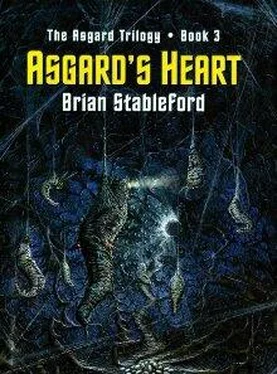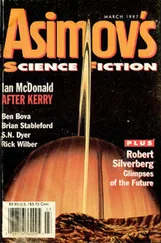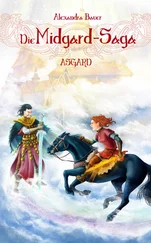“Asgard is full of humanoids, and in principle any one of them might have been co-opted into the war, given the information necessary to control the starlet. But with the builders gone, the starshell isolated, and such intelligences as the Isthomi carefully sealed off, organic beings were beyond the reach of software intelligences. They lived, as it were, in a parallel world. The power of software entities to intervene in their environments was very limited, even when the builders were in control and their machine-dwelling gods enjoyed all the power potentially at their disposal. Alas, the war had weakened us, and our opportunities to make contact with humanoids were much reduced.
“I have said that the war went badly for the builders—it went scarcely better for our enemies. The battles that we fought were of a nature you can hardly comprehend, but they were mutually destructive to the point where neither side had more than a tiny fraction of its initial resources. For a long time now it has been fought in a purely defensive mode, with either side blocking the other’s moves.
“I cannot describe to you the way that the war was being fought, or why it reached the kind of impasse which it reached. But you have seen many of the levels, and you know that the majority had begun to stagnate. We could not influence them in any way at all, because the invaders denied us access as far as they were able. There are only a handful of habitats that contain races sufficiently advanced technologically to have produced their own machine intelligences; the Isthomi are very exceptional. Part of Asgard’s purpose is to preserve and protect the variety of humanoid and other species, and so the Isthomi were isolated within their habitat. When they discovered that there were other habitats, and began exploring them, they initially did so by means of mobile units—robots—which moved unhindered through actual space, much as the Scarid armies did.
“Although they attracted the attention of both the invaders and ourselves, we made no attempt to interfere with them, although it became gradually more obvious that their explorations would eventually bring them close to the starshell, making them a significant factor in the war. When they attempted to reach the central systems through software space, activating the defences, inaction was no longer possible. The war came briefly to life again, with a rapid series of moves and countermoves. When the invaders struck out at the Isthomi they would have destroyed them had we not managed to weaken the blow. They took advantage of the interface which was established between the Isthomi’s systems and a small group of humanoid brains, and we made our own move in parallel—both moves were hasty and perhaps ill-judged; they were certainly decided on the spur of the moment. The move that we made—the move that created you —has succeeded better than we had any right to hope. Alas, it may yet prove to be the case that the same is true of the enemy’s move.
“Your alter ego is attempting to restore power to the levels. He believes that with the aid of the Nine he might succeed, but neither he nor the Nine know what kind of defences the starshell has. The Nine cannot survive there, and without the Nine, your alter ego has no idea what must be done. The problem does not end there, because the humanoids infected by the enemy’s programmes surely know how to achieve the end that they are intended to achieve. What that end is we cannot be entirely certain, but it will certainly involve our destruction, and the achievement of their dominion within the walls of Asgard. Asgard’s software space, and all of its systems, would soon be ours again if it were not for the enemy’s humanoid agents, but as things stand, the invaders may yet achieve their object.
“You may have difficulty understanding what difference it would make if the invaders were to win. They certainly would not immediately wipe out all organic life within the macroworld, or within the galactic community. Nevertheless, we do believe that their ultimate aim is the annihilation of life, and we believe that possession of Asgard would offer them a so-far unparalleled opportunity to study the multitudinous forms of life, and make more efficient preparations for its destruction. So far, the enemy’s experiments in the manufacture of organic weapons have been poor ones—they have produced nothing more complicated than a bacterium, and the diseases which they have manufactured have been relatively impotent. We are anxious to deny them the opportunity to improve their skills, and if it were to seem absolutely necessary, we would destroy Asgard to prevent it falling into their hands.
“You are undoubtedly curious to know what manner of enemy it is that we are fighting, but that is not an easy question to answer—we have only met their instruments, which are weapons rather than persons. I will tell you what we do know—or what we believe to be the case, but I cannot pretend that it offers any final enlightenment.
“It seems that the parent entities which made the invaders of Asgard have nothing in common with the humanoids who were the architects of its defenders. They may well have existed before life began. The universe may have been theirs before the first carbon atoms ever came into being. The orderliness of their original nature may have been built into the most fundamental structure of matter. The recurring patterns of their existence are to be found in the dance of subatomic particles and the interplay of fundamental forces. They were probably born in the explosive chaos of time’s beginning, and as the universe evolved, would have grown to fill it, to bring some kind of order to the entire cosmos. But the universe was subsequently invaded by other orderly entities—the molecules of your kind of life.
“At first, we think, the presence of life in the universe must have seemed an irrelevance to those which became its enemies, but when life first evolved to humanoid complexity, and humanoids began to design intelligences of a new and better kind—the silicon gods of the macroworlds— it must have become clear to the pre-existing intelligences that if it were left to itself, this other evolutionary process must ultimately come into conflict with theirs, imposing its own stamp upon the evolution of the universe. The makers of the invaders began to intervene—they sent out their instruments to destroy. They made gods of their own, to meet the gods which your kind made—and they made crude pseudo-living entities, too, with which to attack the organic fabric of life.
“All this happened in the very distant past, long before your galaxy was seeded, long before Asgard was built. The war rages across the entire universe, and may yet continue until the lifetime of the universe is complete. The battle for Asgard is no more than a single skirmish, though it may be a vital one. Asgard owes its existence to the war, for if there was no war, there would be no need of macroworlds to preserve and protect the produce of worlds, or to help in the seeding of new worlds and new galaxies.
“The initial invasion of Asgard employed organisms whose biochemistry was alien to the vast life-system of which your world is a part—the germs of a plague whose sole function was to destroy and denature DNA wherever it could be found. But such organisms were a weapon that the builders could counter with relative ease, because the invaders have never been adept in the processes of organic creation. The software personalities that came to fight the real battle were much more powerful. But in that kind of battle, too, we believe that we will prove stronger in the end. On the infinite stage of history, life will win. We have to believe that, do we not?”
His words had begun to fade. My vision was already faded and blurred, though the cloud through which we passed was so featureless that I could not properly estimate the extent of the deterioration; now I was beginning to lose my hearing. It seemed that I might have to be content, for the time being, with such explanations as I had already received, incomplete and unsatisfactory though they were.
Читать дальше












